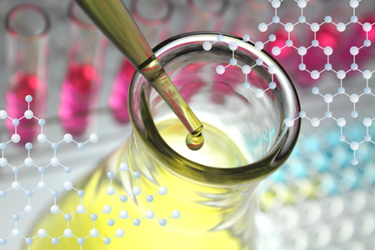Peptide Synthesis: New Market Research
By Aashi Mishra, Research Nester

In organic chemistry, a peptide is created by synthesizing partially protected amino acids. It is a natural process that is increasingly being used in diagnostic instruments and the creation of epitope-scientific antibodies, enzyme binding sites, and antibody epitope mapping. Peptides are frequently employed to treat illnesses and are heavily utilized in pharmaceutical therapies as therapeutic peptides.
Peptide synthesis is a key tool used in biotechnology and pharmaceutical firms to create new vaccines, medications, and enzymes. Peptide synthesis is also among the many services offered by contract development & manufacturing organizations (CDMOs) and contract research organizations (CROs). Several CDMOs provide custom peptide production and synthetic peptide API synthesis that offer a route from pilot and research labs to commercial manufacture.
Chronic diseases are becoming more common, leading to higher development of peptide-based treatments. Additionally, government funding is driving an increase in research efforts to discover novel therapeutic peptides. Consequently, the market for peptide synthesis is anticipated to keep expanding with a growing shift toward personalized medicine. In this article, we share key findings from our new market research report on peptide synthesis.
2 Major Techniques For Peptide Production
1. Solid Phase Peptide Synthesis (SPPS) Technology
SPPS is a peptide synthesis method created by Bruce Merrifield in 1963. It is a ground-breaking technique that has emerged as the primary automated synthesis technology for producing peptides. Pharmaceutical companies rely on this method as it is one of the popular methods for drug discovery.
Moreover, recent innovations in SPPS technology allow for the faster synthesis of peptides, making them more accessible to a variety of users. In August 2024, Bachem AG, together with SpheriTech Ltd., created water-based SPPS to sustain the synthesis of high-quality peptides while lowering the need for organic solvents.
The compatibility of SPSS with automation may further drive its adoption. Over the past few decades, automated support for SPPS has been increasingly utilized for peptide manufacturing on an industrial scale. Besides this, high-quality peptide and protein syntheses are made possible with the innovative ultra-efficient SPPS method. For instance, more than 90% of the waste generated by the standard SPPS approach is eliminated with ultra-efficient SPPS.
2. Liquid Phase Peptide Synthesis (LPPS) Technology
LPPS is a hybrid approach that blends the benefits of SPPS and solution-phase chemistry to permit the manufacture of peptides on a wide scale. It minimizes the use of surplus solvents and reagents. In September 2024, Cambrex Corporation’s Snapdragon Chemistry company developed LPPS technology that drastically lowers the demand for extra chemicals and solvents when compared to conventional SPPS methods.
Moreover, LPPS produces high-quality peptides with fewer contaminants, leading to a higher-quality output and making it appealing to manufacturers and researchers. LPPS is discovering new uses in the creation of peptide-based biomaterials that can be applied to tissue engineering, regenerative medicine, and 3D stem cell cultures.
Peptide Synthesis Industry Analysis
Peptide synthesis is expected to reach a market size of around $1.55 billion by the end of 2037, from approximately $690 million in 2024. Some of the prominent growth propelling factors for the market are:
- Rapid peptide synthesis has become necessary due to the growth of personalized medicine. This allows researchers and clinicians to generate highly tailored treatments to enhance patient outcomes. Additionally, the market is also driven by the increasing usage of peptides in biosensors due to their high sensitivity, high specificity, and low cost.
- The demand for peptides has surged due to the growing burden of chronic diseases such as cancer, diabetes, and cardiovascular disorders.
a. Spotlight on Cancer: Therapeutic peptides have shown promise in practically every field of cancer treatment. There is a lot of promise for immunotherapy with peptide-based cancer vaccines that directly target the immune system. In July 2024, scientists from the University of Manchester discovered an environmentally friendly manufacturing method for producing peptide-based medications to bring about a revolution in the manufacturing of cancer therapies and other serious medical products.
- Peptides may lessen the likelihood of obesity, which is known to be associated with diabetes and elevated inflammation. In October 2024, Antag Therapeutics received approval from the FDA for AT-7687, to provide patients suffering from obesity and cardiometabolic disorders a possible new treatment
- The peptide synthesis market has witnessed significant growth led by the progress in rare disease treatments. In March 2024, AstraZeneca acquired Amolyt Pharma to strengthen Alexion, AstraZeneca’s rare disease late-stage pipeline, by including eneboparatide (AZP-3601), a Phase 3 investigational pharmaceutical peptide to address important hypoparathyroidism treatment objectives.
Regional Analysis
North America's peptide synthesis market has dominated the global market, led by the presence of a highly established pharmaceutical sector. The rising incidence of chronic illnesses including diabetes and obesity contributes to the region's market growth. The United States is seeing an increase in obesity due to the aggressive consumption of meals heavy in fat and processed sugars.
The peptide synthesis market in the Asia Pacific region is expected to register the fastest growth during the forecast period (2024 to 2037) propelled by the growing knowledge of novel peptide-based therapies.
Companies Dominating The Peptide Synthesis Landscape
- AAPP Tec
- Bachem Holding AG
- Biotage
- CEM Corporation
- CordenPharma International
- CSBio Company Inc.
- Evonik
- GenScript
- ProteoGenix
- Thermo Fisher Scientific Inc.
The Key Takeaways In A Nutshell
The future of peptide synthesis will likely offer growth opportunities as future therapeutics. The need for accurate and dependable peptide synthesis is growing in the dynamic fields of biotechnology and life sciences. A huge increase in demand for peptide synthesis services is anticipated, led by increasing investment in cutting-edge synthesis technologies. SPPS and LPPS are the two common techniques for synthesizing peptides. SPPS makes it possible to precisely create complicated peptide sequences guaranteeing precise sequence assembly, whereas, longer peptide chains are synthesized using LPPS, resulting in increased output and purity. Overall, the peptide synthesis market holds enormous potential to influence biotechnology and medicine.
 About The Author:
About The Author:
Aashi Mishra works at Research Nester and is an experienced research writer and strategist with a demonstrated history of research in a myriad of industries.
